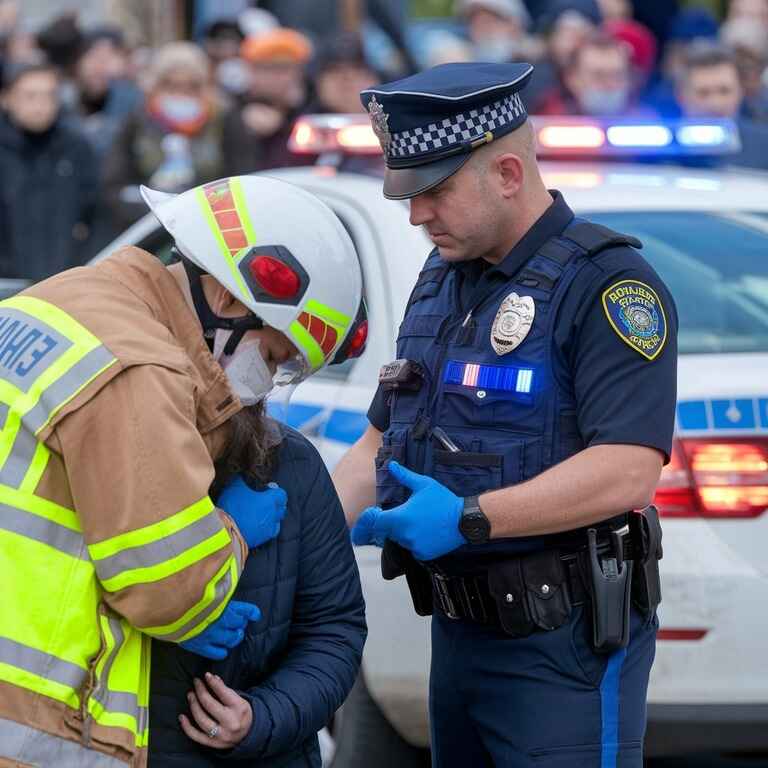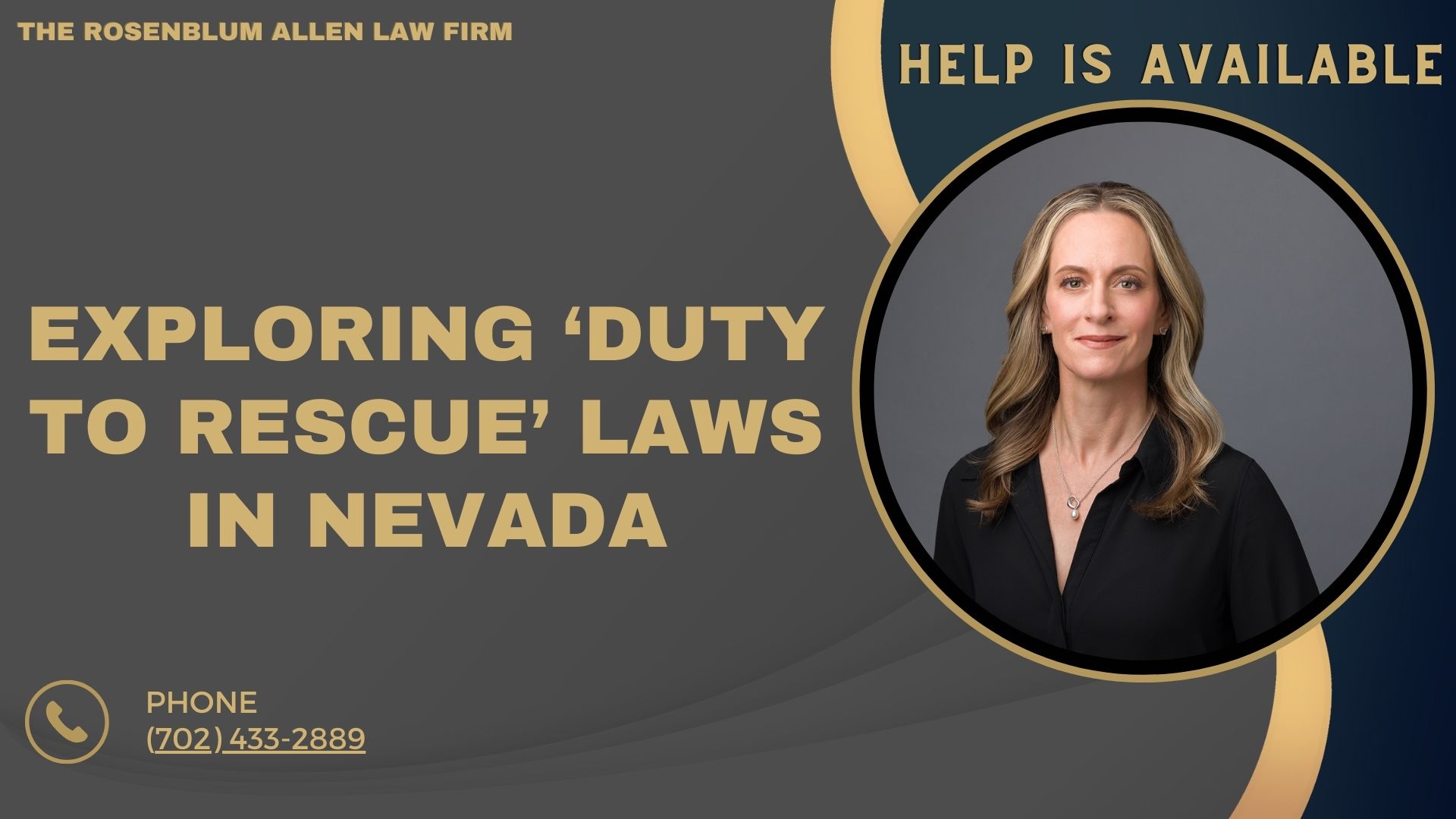The concept of the duty to rescue law is an important yet often misunderstood area of legal responsibility. In Nevada, understanding these laws can help you navigate your legal obligations in emergencies and avoid unintended consequences. Whether you’re a concerned citizen, a professional with specific legal duties, or simply curious about your rights, this article will provide a comprehensive breakdown of Nevada’s duty to rescue law.
 Understanding Duty to Rescue Laws
Understanding Duty to Rescue Laws
Definition of Duty to Rescue Laws
Duty to rescue-laws are legal requirements that compel individuals to assist others in emergencies under specific circumstances. These laws encourage societal responsibility and ensure that those in dire situations receive help.
General Meaning and Purpose
- Promote public safety and welfare.
- Balance individual freedoms with societal obligations.
- Reduce harm or fatalities in emergencies by encouraging timely intervention.
Common Scenarios Where These Laws Apply
- Witnessing a car accident where a victim is trapped or injured.
- Observing someone in immediate physical danger, such as drowning or choking.
- Encountering someone incapacitated due to a crime or medical emergency.
Origins of Duty to Rescue Laws in the United States
Historical Context
The concept of duty to rescue has its roots in early moral and ethical principles. While some European legal systems impose stricter obligations to assist, the U.S. has historically adopted a more cautious approach, emphasizing personal autonomy.
Legal Evolution and Principles
- Common law traditionally avoided imposing a general duty to assist, except in specific relationships (e.g., parent-child, employer-employee).
- Modern statutes, such as Good Samaritan laws, were introduced to balance the need for assistance with protections against liability for those who help.
Duty to Rescue Law in Nevada
Nevada’s Specific Laws on Duty to Rescue
Nevada has a unique approach to the duty to rescue laws, combining certain mandatory requirements with protections for those who assist in emergencies.
Legal Obligations Under Nevada Revised Statutes (NRS)
- Nevada law mandates the duty to report specific crimes, such as child abuse or neglect (NRS 432B.220).
- There is no universal duty for bystanders to intervene in emergencies, but certain circumstances may create an obligation.
Key Provisions Unique to Nevada
- Legal expectations differ for ordinary citizens versus professionals (e.g., healthcare workers, and law enforcement).
- Nevada’s Good Samaritan laws (NRS 41.500) provide immunity from liability for individuals who assist in good faith.
Comparison with Other States’ Laws
Nevada’s duty to rescue-laws are less stringent compared to some states that impose broader obligations.
States with Strict Duty to Rescue Laws
- States like Minnesota and Vermont require bystanders to render reasonable aid during emergencies, with penalties for failing to act.
How Nevada Differs
- Nevada imposes fewer mandatory requirements on bystanders but emphasizes voluntary assistance supported by Good Samaritan protections.
Exceptions to Nevada’s Duty to Rescue Laws
Certain situations exempt individuals from legal responsibility to assist or report.
Circumstances Exempting Individuals from Legal Responsibility
- If helping would place the rescuer in immediate physical danger.
- Lack of reasonable ability to provide effective assistance (e.g., insufficient skills or equipment).
Role of Personal Safety in Determining the Duty to Act
- Nevada law prioritizes the rescuer’s safety, recognizing that self-endangerment is not legally required.
- Individuals are encouraged to assist by contacting authorities if direct intervention isn’t feasible.

When Are You Legally Required to Help in Nevada?
Situations Where Duty to Rescue Applies
Nevada does not impose a general obligation for bystanders to help in emergencies. However, there are specific situations where a legal duty to act may exist:
- Witnessing a crime against a child: Nevada law (NRS 432B.220) requires individuals to report suspected child abuse or neglect to authorities. Failure to do so can lead to legal penalties.
- Professional obligations: Doctors, nurses, police officers, and other professionals may be legally bound to assist under their professional codes of conduct or licenses.
- Voluntary intervention: If you decide to help someone, you could assume a duty of care. This means you are legally expected to act reasonably and avoid causing harm.
Examples of Duty to Rescue in Action
Let’s look at some scenarios to clarify:
| Scenario | Legal Duty in Nevada |
|---|---|
| You see a child locked in a hot car. | You must report it to law enforcement immediately. Failing to do so may lead to charges. |
| You pass by a car accident. | You are not required to help unless you choose to intervene or are professionally obligated. |
| A friend collapses at your home. | If you provide aid, you must act reasonably to avoid worsening the situation. |
These examples show that while Nevada doesn’t impose broad obligations, specific cases may still require action.
Examples of Duty to Rescue in Action
Imagine this: You’re walking through a park and notice a child wandering alone, crying. In Nevada, you are legally required to report the situation if you suspect abuse or neglect. Failing to make the call could result in legal consequences.
Or consider witnessing a minor car accident. There’s no law forcing you to stop, but if you choose to help and provide medical aid, you must act carefully to avoid causing harm.
Consequences of Violating Duty to Rescue Law in Nevada
Legal Penalties for Non-Compliance
Failing to fulfill a legal duty to rescue can lead to serious consequences in Nevada. These include:
- Fines: Depending on the situation, fines for non-compliance can range from hundreds to thousands of dollars.
- Criminal charges: In cases like failing to report child abuse, you could face misdemeanor or even felony charges.
- Civil liability: If someone suffers harm because you failed to act when legally required, you could be sued for damages.
High-Profile Nevada Cases Involving Duty to Rescue Violations
There have been instances where individuals faced penalties for ignoring their duty to act. For example:
- A teacher failed to report suspected abuse involving a student and was charged under mandatory reporting laws.
- A bystander who refused to call for help in an obvious medical emergency faced public backlash and potential legal consequences.
These cases highlight the importance of knowing your legal responsibilities in Nevada.
Impact on Public Perception and Personal Reputation
Even if you avoid legal penalties, ignoring someone in need can damage your reputation. In our interconnected world, stories about bystanders who failed to help often go viral. Public scrutiny can lead to social or professional consequences, even if the law doesn’t hold you accountable.

Legal Protections for Rescuers in Nevada
Good Samaritan Laws and Their Role
Nevada’s Good Samaritan laws (NRS 41.500) are designed to encourage people to assist others in emergencies without fear of being sued. These laws provide immunity from liability, but there are limits.
Protections Provided to Individuals Who Act in Good Faith
If you render aid in good faith and without gross negligence, you are generally protected under Nevada’s Good Samaritan laws. For example:
- Performing CPR on someone who has collapsed, even if you’re not a medical professional.
- Helping someone injured in a car accident until emergency responders arrive.
Situations Where Rescuers May Still Face Liability
Good Samaritan laws do not protect every action. You could still face liability if:
- You act recklessly: For example, attempting to perform an advanced medical procedure without the necessary training.
- You worsen the situation: If your actions cause additional harm, you might be held responsible.
- You expect compensation: Protections typically apply only to those who help without expecting to be paid.
How Nevada’s Laws Balance Responsibility and Protection
These laws are designed to strike a balance. They encourage people to act when they can help but ensure that those who assist do so responsibly.
Common Misconceptions About Nevada’s Duty to Rescue Law
Myths vs. Facts
There are many misconceptions about Nevada’s duty to rescue law. Let’s clear up some of the most common ones:
Myth: “You’re always legally required to help someone in danger.”
Fact: Nevada does not impose a universal duty to assist, except in specific cases like reporting child abuse.
Myth: “If I try to help, I’ll get sued if something goes wrong.”
Fact: Nevada’s Good Samaritan laws protect those who act in good faith and without negligence.
Myth: “Only trained professionals can assist in emergencies.”
Fact: Anyone can help within their ability. Even calling 911 is a valuable form of assistance.
Misinterpretation of Good Samaritan Protections
Good Samaritan laws often lead to confusion. While they offer protection, they don’t cover reckless or negligent actions. For example, if you attempt CPR but lack training, you’re protected if you act reasonably and in good faith.
What Good Samaritan Laws Do and Don’t Cover
Good Samaritan ProtectionsNot Covered
Acting in good faith. Reckless or negligent actions.
Providing reasonable assistance. Expecting payment for your help.
Staying within your ability. Worsening the situation unnecessarily.

Practical Tips for Responding to Emergencies in Nevada
How to Decide Whether to Help
Deciding whether to step in during an emergency can be overwhelming. Your instincts may push you to act, but pausing and assessing is essential.
Key Questions to Ask Yourself:
- Is the situation safe for me to approach?
- If there’s immediate danger, such as fire or electrical hazards, prioritize your safety.
- Can I reasonably help without causing harm?
- Only assist within your skillset. For instance, if you’re not trained in CPR, focus on calling 911.
- What’s the fastest way to get help?
- Sometimes, the best action is to contact emergency responders rather than intervening directly.
Example of Making a Decision:
Imagine you see someone struggling in a lake. If you’re a strong swimmer, you might try to help—but only if it’s safe. If not, throwing a flotation device or calling for professional help is better.
Simple Ways to Assist Without Risking Yourself
You don’t have to be a hero to make a difference. Even small actions can save lives.
Examples of Low-Risk Assistance:
- Call 911 and provide detailed information about the emergency.
- Direct bystanders should stay calm and clear the area for first responders.
- Offer comfort to the person in need by talking to them and reassuring them that help is on the way.
When in Doubt, Focus on These Three Actions:
- Stay calm and collected. Panicking will only make the situation harder to manage.
- Notify authorities immediately. Time is critical in emergencies.
- Stay with the person if it’s safe. Your presence alone can provide emotional support.

Breaking It All Down
Nevada’s duty to rescue law is designed to balance personal freedom with societal responsibility. While the law doesn’t require most citizens to act in emergencies, there are specific situations where assistance or reporting is mandatory. Understanding these laws can help you avoid legal trouble while positively impacting your community.
If you’re unsure how to help, remember this: your actions can make a difference, no matter how small. Calling 911, offering comfort, or learning basic first aid are all meaningful ways to contribute. With Good Samaritan protections in place, you’re encouraged to help without fear of liability as long as you act responsibly.
By preparing yourself with knowledge and training, you can be ready to respond to emergencies safely and legally. After all, choosing to help when you can is one of the most powerful ways to show compassion and care for others.

Frequently Asked Questions
What is Nevada's duty to rescue law?
Nevada generally does not require bystanders to assist in emergencies. However, there are exceptions, such as mandatory reporting of child abuse or neglect and specific professional obligations for certain roles like doctors and first responders.
Am I legally required to help someone in an emergency?
No, Nevada law does not impose a general duty to rescue. However, if you voluntarily choose to help, you must act reasonably and avoid causing harm.
What happens if I fail to report child abuse or neglect in Nevada?
Under Nevada law (NRS 432B.220), you are legally required to report suspected child abuse or neglect. Failing to do so can result in criminal charges, including fines or jail time.
Can I be sued if I help someone and something goes wrong?
Nevada’s Good Samaritan laws (NRS 41.500) protect individuals who assist in emergencies from being sued as long as they act in good faith and without gross negligence.
What does "acting in good faith" mean?
Acting in good faith means genuinely trying to help someone without any malicious intent or expectation of payment. It also means doing your best not to worsen the situation.
Are there any exceptions to the Good Samaritan law?
Yes. Reasonable Samaritan protections do not cover the following:
- Reckless or negligent actions.
- Situations where you intentionally cause harm.
- Attempts to assist in exchange for compensation.
What should I do if I want to help but don't know how?
The best action is to call 911 immediately and provide accurate details about the emergency. While waiting for professionals to arrive, you can also offer emotional support to the person in need.
Do professionals have a higher duty to rescue than the average person?
Yes. Doctors, nurses, police officers, and other professionals often have a legal or ethical obligation to assist in emergencies, mainly when on duty or acting professionally.
How can I prepare myself to help in emergencies?
You can take first aid and CPR training courses, participate in local emergency preparedness workshops, and familiarize yourself with Nevada’s Good Samaritan laws and mandatory reporting requirements.
What are the penalties for violating Nevada's duty to rescue requirements?
Penalties vary based on the situation. For instance:
- Failing to report suspected child abuse can result in misdemeanor or felony charges.
- Civil liability may apply if your failure to act causes harm to another person.
How does Nevada's duty to rescue laws compare to other states?
Unlike some states with strict duty-to-rescue laws, Nevada does not impose a broad obligation for bystanders to act. Its laws focus on specific scenarios, such as reporting child abuse, and provide strong Good Samaritan protections for those who choose to help.

Additional Resources for You from The Rosenblum Allen Law Firm.
At The Rosenblum Allen Law Firm, we provide comprehensive legal services beyond surrogacy. Below are some additional resources that may be helpful, with embedded links for your convenience:
Criminal Defense Attorney: If you are facing criminal charges, our experienced defense team is here to protect your rights and fight for the best possible outcome.
Las Vegas DUI Lawyer: We help individuals accused of DUI offenses navigate the legal process, minimize penalties, and protect their driving privileges.
Domestic Violence Lawyer Las Vegas: If you are dealing with allegations of domestic violence, we offer compassionate representation to help you through these challenging situations.
Drug Possession Lawyer: Whether you’re facing misdemeanor or felony drug charges, we provide aggressive legal defense to safeguard your future.
Sex Crimes Attorney: Our firm offers discreet, skilled representation for those accused of sensitive sex crime cases, ensuring that your rights are protected.
CPS Defense Attorney: If you are facing allegations of child abuse or neglect, we are here to protect your parental rights and guide you through the CPS process.
Misdemeanor Lawyer: For minor offenses, our team helps clients resolve their cases efficiently and minimize long-term consequences.
Las Vegas Warrant Defense Attorney: If you have an active warrant, we can help you address it before it escalates to an arrest.
Las Vegas Probation Violation Attorney: If you’ve been accused of violating probation, we’ll work to defend you and reduce potential penalties.
Theft Crime Defense Lawyer: Whether you’re facing shoplifting or more serious theft charges, our firm is prepared to defend your case.
Kidnapping Lawyers: If you’re dealing with kidnapping charges, we’ll provide strategic legal support tailored to your situation.
Juvenile Defense Lawyers: Our firm is dedicated to protecting the rights of juveniles and helping them navigate the justice system.
Firearms Lawyer Las Vegas: We assist clients accused of firearm-related offenses, ensuring their rights are preserved and their cases are handled effectively.
Let us know how we can help. At The Rosenblum Allen Law Firm, your case is our priority. Feel free to reach out to us for assistance or consultation!

Offsite Resources for You
Here are seven useful offsite resources that readers may find helpful for understanding Nevada’s duty to rescue law, emergency response, and related topics:
American Red Cross
Learn about emergency preparedness and find training opportunities in first aid, CPR, and disaster response. Visit their homepage: American Red Cross.Nevada Department of Health and Human Services (DHHS)
Explore resources on mandatory reporting laws and child welfare programs in Nevada. Visit their homepage: Nevada DHHS.Nevada Division of Emergency Management
Access information about state-level disaster preparedness and community safety initiatives. Visit their homepage: Nevada DEM.National Safety Council (NSC)
Learn about safety practices, including responding to emergencies, and access helpful resources for individuals and communities. Visit their homepage: National Safety Council.American Heart Association
Find resources on learning CPR and other life-saving techniques to be better prepared for emergencies. Visit their homepage: American Heart Association.Nevada State Bar Association
Discover legal resources, including information about duty to rescue laws and professional obligations for attorneys and others. Visit their homepage: State Bar of Nevada.Federal Emergency Management Agency (FEMA)
Access resources on emergency management, preparedness training, and community resilience. Visit their homepage: FEMA.

A Special Message from Our Lead Attorney, Molly Rosenblum Allen, Esq

Thank you for taking the time to explore these helpful resources. I hope you found the information valuable and that it provides a clearer understanding of your rights and responsibilities in emergencies.
If you have any questions or need further assistance, my team and I are here to help. Feel free to call us at (702) 433-2889, and we’ll be happy to discuss your situation and how we can assist you moving forward.
Best regards,
Molly
The Rosenblum Allen Law Firm





